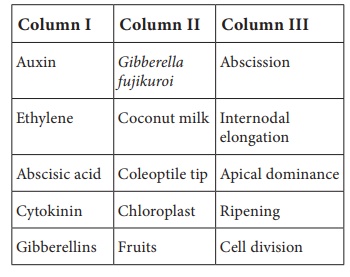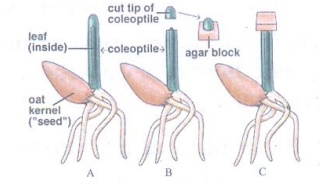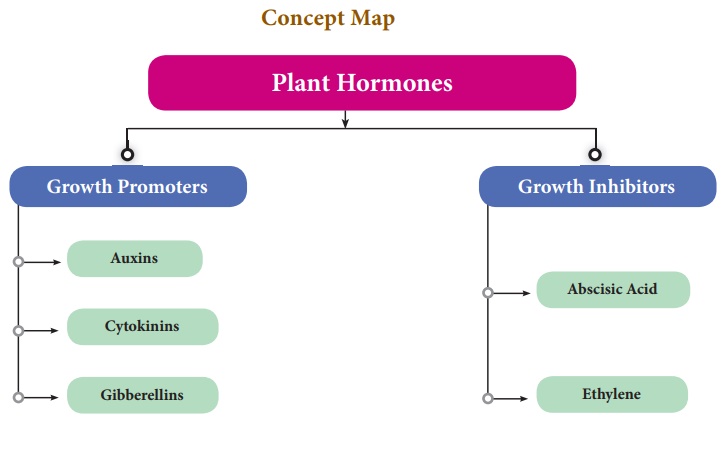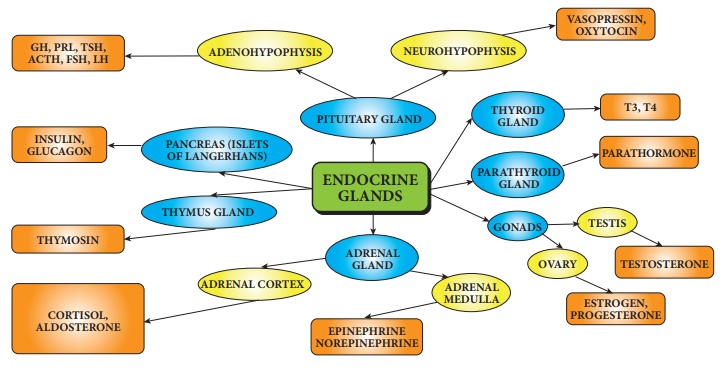Plant and Animal Hormones | Science - Book Back Questions with Answers | 10th Science : Chapter 16 : Plant and Animal Hormones
Chapter: 10th Science : Chapter 16 : Plant and Animal Hormones
Book Back Questions with Answers
Plant and Animal Hormones (Science)
I. Choose the correct answer
1. Gibberellins cause:
a) Shortening of genetically tall plants
b) Elongation of dwarf plants
c) Promotion of rooting
d) Yellowing of young leaves
2. The hormone which has positive effect on apical dominance is:
a) Cytokinin
b) Auxin
c) Gibberellin
d) Ethylene
3. Which one of the following hormones is naturally not found in plants:
a) 2, 4-D
b) GA3
c) Gibberellin
d) IAA
4. Avena coleoptile test was conducted by
a) Darwin
b) N. Smit
c) Paal
d) F.W. Went
5. To increase the sugar production in sugarcanes they are sprayed with _______
a) Auxin
b) Cytokinin
c) Gibberellins
d) Ethylene
6. LH is secreted by
a) Adrenal gland
b) Thyroid gland
c) Anterior pituitary
d) Hypothalamus.
7. Identify the exocrine gland
a) Pituitary gland
b) Adrenal gland
c) Salivary gland
d) Thyroid gland
8. Which organ acts as both exocrine gland as well as endocrine gland
a) Pancreas
b) Kidney
c) Liver
d) Lungs
9. Which one is referred as “Master Gland”?
a) Pineal gland
b) Pituitary gland
c) Thyroid gland
d) Adrenal gland
II. Fill in the blanks
1. Auxin causes cell elongation, apical dominance and prevents abscission.
2. Ethylene is a gaseous hormone involved in abscission of organs and acceleration of fruit ripening.
3. Abscissic acid causes stomatal closure.
4. Gibberellins induce stem elongation in rosette plants.
5. The hormone which has negative effect on apical dominance is cytokinin.
6. Calcium metabolism of the body is controlled by parathormone.
7. In the islets of Langerhans, beta cells secrete insulin.
8. The growth and functions of thyroid gland is controlled by thyroid stimulating hormone.
9. Decreased secretion of thyroid hormones in the children leads to cretinism.
III a) Match Column I with Columns II and III

Answer:
Column I : Column II : Column III
Auxin : Coleoptile tip : Apical dominance
Ethylene : Fruits : Ripening
Abscisic acid : Chloroplast : Abscission
Cytokinin : Coconut milk : Cell division
Gibberellins : Gibberella fujikuroi : Internodal elongation
III b) Match the following hormones with their deficiency states
Hormones Disorders
a) Thyroxine - Acromegaly
b) Insulin - Tetany
c) Parathormone - Simple goitre
d) Growth hormone - Diabetes insipidus
e) ADH - Diabetes mellitus
Answer:
Hormones - Disorders
a) Thyroxine - Simple goitre
b) Insulin - Diabetes mellitus
c) Parathormone - Tetany
d) Growth hormone - Acromegaly
e) ADH - Diabetes insipidus
IV State whether True or false, If false write the correct statement
1. A plant hormone concerned with stimulation of cell division and promotion of nutrient mobilization is cytokinin. - True
2. Gibberellins cause parthenocarpy in tomato.
3. Ethylene retards senescence of leaves, flowers and fruits. - False
Ethylene hastens senescence of leaves, flowers and fruits.
4. Exopthalmic goiter is due to the over secretion of thyroxine.
5. Pituitary gland is divided into four lobes.
Pituitary gland is divided into three lobes.
6. Estrogen is secreted by corpus luteum.
Estrogen is secreted by the graffian follicles of the ovars.
V. Assertion and Reasoning
Direction: In each of the following questions a statement of assertion (A) is given and a corresponding statement of reason (R) is given just below it. Mark the correct statement as.
a. If both A and R are true and R is correct explanation of A
b. If both A and R are true but R is not the correct explanation of A
c. A is true but R is false
d. Both A and R are false
1. Assertion: Application of cytokinin to marketed vegetables can keep them fresh for several days.
Reason: Cytokinins delay senescence of leaves and other organs by mobilisation of nutrients.
Answer: b. If both A and R are true but R is not the correct explanation of A
2. Assertion (A): Pituitary gland is referred as “Master gland”.
Reason (R): It controls the functioning of other endocrine glands.
Answer: a. If both A and R are true and R is correct explanation of A
3. Assertion (A): Diabetes mellitus increases the blood sugar levels.
Reason (R):Insulin decreases the blood sugar levels.
Answer: b. If both A and R are true but R is not the correct explanation of A
VI. Answer in a word or sentence
1. Which hormone promotes the production of male flowers in Cucurbits?
Gibberellin.
2. Write the name of a synthetic auxin.
2,4 D (2, 4 Dichlorophenoxy Acetic acid).
3. Which hormone induces parthenocarpy in tomatoes?
Gibberellin.
4. What is the hormone responsible for the secretion of milk in female after child birth?
Prolactin.
5. Name the hormones which regulates water and mineral metabolism in man.
Aldosterone.
6. Which hormone is secreted during emergency situation in man?
Adrenalin.
7. Which gland secretes digestive enzymes and hormones?
Pancreas.
8. Name the endocrine glands associated with kidneys.
Adrenal gland.
VII Short answer questions
1. What are synthetic auxins? Give examples.
Artificially Synthesized Auxins that have properties like Auxins are called as Synthetic Auxins. Example : 2, 4 D (2,4 Dichlorophenoxy Acetic Acid)
2. What is bolting? How can it be induced artificially?
Treatment of Rosette plants with Gibberellin induces sudden shoot elongation followed by flowering. This is called bolting.
3. Bring out any two physiological activities of abscisic acid
(i) ABA promotes the process of separation of leaves, flowers and fruits (abscission).
(ii) During water stress and drought conditions ABA causes stomatal closure.
4. What will you do to prevent leaf fall and fruit drop in plants? Support your answer with reason.
Spraying with Auxins can help to prevent leaf fall and fruit drop in a plant. This is because Auxins prevent the formation of a abscission layer which is formed before separation of plant parts.
5. What are chemical messengers?
The hormones produced by the endocrine glands are called chemical messengers. They diffuse into the blood stream and are carried to distant parts of the body. They act on specific organs called target organs.
6. Write the differences between endocrine and exocrine gland.
Endocrine Gland
1. They are called ductless glands. Their secretions are carried by the blood stream.
2. They produce hormones.
Eg : Thyroid gland.
Exocrine Gland
1. They have ducts to carry their secretions.
2. They produce enzymes.
Eg : Salivary gland.
7. What is the role of parathormone?
The parathormone regulates calcium and phosphorus metabolism in the body. They act on bone, kidney and intestine to maintain blood calcium levels.
8. What are the hormones secreted by posterior lobe of the pituitary gland? Mention the tissues on which they exert their effect.
The hormones secreted by the posterior lobe of the pituitary gland are
(a) Vasopressin : In kidney tubules it increases reabsorption of water. It reduces loss of water through urine and hence the name antidiuretic hormone.
(b) Oxytocin helps in the contraction of the smooth muscles of uterus at the time of child birth and milk ejection from the mammary gland after child birth.
9. Why are thyroid hormones refered as personality hormone?
Thyroid hormone is essential for normal physical, mental and personality development. It is also known as personality hormone.
10. Which hormone requires iodine for its formation? What will happen if intake of iodine in our diet is low?
(i) The hormone thyroxine secreted by the thyroid gland requires iodine for its formation.
(ii) If the intake of iodine in our diet is low, the thyroid gland will not be able to secrete sufficient quantity of thyroxine.
(iii) This is called thyroid dysfunction and leads to hypothyroidism.
(iv) The following diseases are caused due to hypothyroidism.
(a) Simple Goitre (b) Cretinism (c) Myxoedema
VIII. Long answer questions
1. (a) Name the gaseous plant hormone. Describe its three different actions in plants.
(b) Which hormone is known as stress hormone in plants ? Why?
Answer:
(a)
Ethylene
is the gaseous plant hormone. Its physiological effects are:
(i) Ethylene promotes the ripening
of fruits. Eg : Apple, Mango, Banana, etc.
(ii) Ethylene inhibits
the elongation of stem and root in
dicots.
(iii) Ethylene hastens the senescence of leaves and
flowers.
(b)
Abscisic
acid (ABA) is a growth inhibitor which regulates abscission and dormancy. It
increases tolerance of plants to various kinds of stress. So, it is also called
as stress hormone. It is found in the chloroplast of plants.
2. Describean experiment which demonstrates that growth stimulating hormone is produced at the tip of coleoptile.
Answer:
(i) Frits Warmolt Went, a Dutch biologist
demonstrated the existence and effect of auxin in plants. He did a series of
experiments in Avena coleoptiles.

A. Germination of an oat seed
B. Decapitate tip of coleoptile and place on agar
block
C. Agar block is placed on top of the decapitated
tip of the seedling
(ii) In his first experiment, he removed the tips of
Avena coleoptiles. The cut tips did not grow indicating that the tips produced
something essential for growth.
(iii) In his second experiment, he placed the agar
blocks on the decapitated coleoptile tips. The coleoptile tips did not show any
response.
(iv) In his next experiment, he placed the detached
coleoptile tips on agar blocks. After an hour, he discarded the tips and placed
this agar block on the decapitated coleoptile.
(v) It grew straight up indicating that some chemical
had diffused from the cut coleoptiles tips into the agar block which stimulated
the growth.
(vi) From his experiments Went concluded that a
chemical diffusing from the tip of coleoptiles was responsible for growth, and
he named it as “Auxin” meaning ‘to grow”.
3. Write the physiological effects of gibberellins.
Answer:
(i) Application of gibberellins on plants stimulate
extraordinary elongation of internode. E.g: Corn and Pea.
(ii) Treatment of rosette plants with gibberellin
induces sudden shoot elongation followed by flowering. This is called bolting.
(iii) Gibberellins promote the production of male flowers in monoecious
plants (Cucurbits).
(iv) Gibberellins break dormancy of Potato tubers.
(v) Gibberellins are efficient than auxins in inducing the formation of seedless fruit - Parthenocarpic fruits (Development of fruits without fertilization) E.g: Tomato.
4. Where are estrogens produced? What is the role of estrogens in the human body?
Answer:
Estrogen
is a female sex hormone and is produced by the Graafian follicles of the Ovary.
Role of Estrogens in the human body :
(i) It brings about the changes that occur during
puberty.
(ii) It initiates the process of oogenesis.
(iii) It stimulates the maturation of ovarian follicles
in the ovary.
(iv) It promotes the development of secondary sexual
characters (breast development, high pitched voice etc).
5. What are the conditions which occur due to lack of ADH and insulin? How are the conditions different from one another?
Answer:
(a) ADH - Anti diuretic hormone produced by posterior
lobe of pituitary gland and is also known as Vasopressin.
Deficiency
of ADH reduces reabsorption of water and causes an increase in urine output
(polyuria). This deficiency disorder is called Diabetes
insipidus.
Insulin - Hormone produced by beta cells of Islets of
Langerhans.
The
deficiency of insulin causes Diabetes mellitus. It is charactersied by
(i) Increase in blood sugar level (Hyperglycemia).
(ii) Excretion of excess glucose in the urine
(Glycosuria).
(iii) Frequent urination (Polyuria).
(iv) Increased thirst (Polydipsia).
(v) Increase in appetite (Polyphagia).
(b) Diabetes insipidus results in increase of urine
output.
In
the case of diabetes mellitus there is frequent urination (polyuria) and excess
of glucose is also secreted along with urine. (Glycosuria).
IX Higher Order Thinking Skills (HOTS)
1. What would be expected to happen if
a. Gibberellin is applied to rice seedlings.
b. A rotten fruit gets mixed with unripe fruits.
c. When cytokinin is not added to culture medium
a. Gibberellin will cause internodal elongation in rice.
b. The rotten fruit will produce lot of Ethylene and the unripe fruits will begin to ripen quickly.
c. Cytokinin induces cell division. If it is not added to culture medium, division of cells will not occur and the cultured tissue will not show growth.
3. A plant hormone was first discovered in Japan when rice plants were suffering from Bakanae disease caused by Gibberella fujikoroi. Based on this information answer the following questions:
a. Identify the hormone involved in this process.
b. Which property of this hormone causes the disease?
c. Give two functions of this hormone.
a. Gibberellin
b. Application of gibberellins on plants stimulate extraordinary elongation of internode. This causes Bakanae disease.
c. 1. Gibberellin breaks dormancy of Potato tubers.
2. They promote the production of male flowers in monoecious plants (Cucurbits).
4. Senthil has high blood pressure, protruded eyeball and an increased body temperature. Name the endocrine gland involved and hormone secretion responsible for this condition.
Endocrine gland - Thyroid gland.
Hormone - Thyroxine (Excess secretion).
5. Sanjay is sitting in the exam hall. Before the start of the exam , he sweats a lot, with increased rate of heart beat. Why does this condition occur?
Sanjay is sitting in the exam hall. He is tensed about the exam and is worried. In stressful situation, the hormone Adrenaline is produced by Adrenal gland. It helps the body to handle stressful situations as follows and is produced during conditions of stress and emotion.
(i) It increases heart beat and blood pressure.
(ii) It decreases blood flow through the skin. Thus Sanjay sweats a lot and has increased rate of heart beat.
6. Susan’s father feels very tired and frequently urinates. After clinical diagnosis he was advised to take an injection daily to maintain his blood glucose level. What would be the possible cause for this? Suggest preventive measures.
(i) Susans' father must be suffering from Diabetes mellitus.
(ii) Due to deficiency of the hormone insulin produced by the pancreas his blood sugar level would have increased.
(iii) Therefore he would have been advised to take insulin injection daily to maintain his blood glucose level.
(iv) Frequent urination is a symptom of the disease and excess glucose is also lost from the body through urine. Therefore he would feel tired.
Preventive measures for Diabetes Mellitus :
(i) Intake of foods rich in protein and avoid sugary foods like fruit juices, fruits, starchy vegetables.
(ii) Regular physical exercise.
Intake of whole grains and wheat based products.


Related Topics